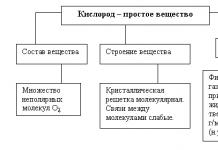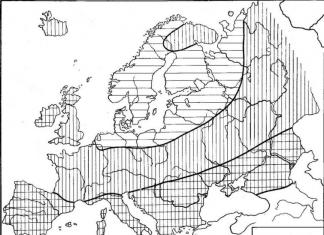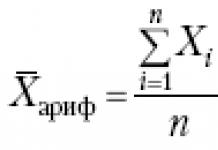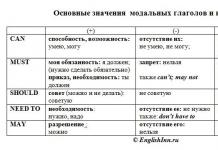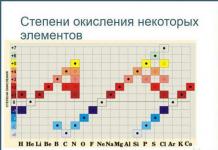This Russian language is difficult, dear citizens! The trouble is, what a difficult one.
The main reason is that there are too many foreign words in it. Well, take French speech. Everything is good and clear. Keskese, merci, comsi - all, please note, purely French, natural, understandable words.
Come on, come on now with the Russian phrase - trouble. The whole speech is peppered with words with a foreign, vague meaning.
This makes speech difficult, breathing is impaired and nerves fray.
I heard a conversation the other day. There was a meeting. My neighbors started talking.
It was a very smart and intelligent conversation, but I, a person without a higher education, had difficulty understanding their conversation and flapped my ears.
The matter began with trifles.
My neighbor, not yet an old man with a beard, leaned over to his neighbor on the left and politely asked:
– What, comrade, will this be a plenary meeting or what?
“Plenary,” the neighbor answered casually.
“Look,” the first one was surprised, “that’s why I’m looking, what is it?” As if it were plenary.
“Yes, be calm,” the second one answered sternly. – Today it’s very plenary and the quorum has reached such a level – just hang in there.
- Yah? - asked the neighbor. – Is there really a quorum?
“By God,” said the second.
- And what is it, this quorum?
“Nothing,” answered the neighbor, somewhat confused. – I got it, and that’s it.
“Please tell me,” the first neighbor shook his head with disappointment. - Why would it be him, huh?
The second neighbor spread his hands and looked sternly at his interlocutor, then added with a soft smile:
“You, comrade, probably don’t approve of these plenary sessions... But somehow they are closer to me.” Everything somehow, you know, comes out in them minimally on the essence of the day... Although I will say frankly that lately I have been quite permanent about these meetings. So, you know, the industry is going from empty to empty.
“That’s not always the case,” the first objected. – If, of course, you look at it from the point of view. To enter, so to speak, into the point of view and from the point of view, then - yes, the industry specifically.
“Specifically, in fact,” the second one sternly corrected.
“Perhaps,” the interlocutor agreed. – I admit that too. Specifically in fact. Although how when...
“Always,” the second one snapped shortly. - Always, dear comrade. Especially if after the speeches the subsection is brewing minimally. Discussions and shouting will not end then...
A man walked up to the podium and waved his hand. Everything fell silent. Only my neighbors, somewhat heated by the argument, did not immediately fall silent. The first neighbor could not come to terms with the fact that the subsection was welded minimally. It seemed to him that the subsection was brewed a little differently.
They shushed my neighbors. The neighbors shrugged their shoulders and fell silent. Then the first neighbor leaned over to the second again and quietly asked:
- Who is this guy who came out there?
- This? Yes, this is the presidium. A very sharp man. And the speaker is the first. Always speaks sharply on the essence of the day.
The speaker extended his hand forward and began speaking.
And when he uttered arrogant words with a foreign, vague meaning, my neighbors nodded their heads sternly. Moreover, the second neighbor looked sternly at the first, wanting to show that he was still right in the dispute that had just ended.
It is difficult, comrades, to speak Russian!
Read the texts of stories, short storiesMikhail M. Zoshchenko
Monkey tongue
This Russian language is difficult, dear citizens! The trouble is, what a difficult one.
The main reason is that there are too many foreign words in it. Well, take French speech. Everything is good and clear. Keskese, merci, comsi - all, please note, purely French, natural, understandable words.
Come on, come on now with the Russian phrase - trouble. The whole speech is peppered with words with a foreign, vague meaning.
This makes speech difficult, breathing is impaired and nerves fray.
I heard a conversation the other day. There was a meeting. My neighbors started talking.
It was a very smart and intelligent conversation, but I, a person without a higher education, had difficulty understanding their conversation and flapped my ears.
The matter began with trifles.
My neighbor, not yet an old man with a beard, leaned over to his neighbor on the left and politely asked:
And what, comrade, will this be a plenary meeting or what?
“Plenary,” the neighbor answered casually.
“Look,” the first one was surprised, “that’s why I’m looking, what is it?” As if it were plenary.
“Yes, be calm,” the second one answered sternly. - Today it is very plenary and the quorum has reached such a level - just hang in there.
Yah? - asked the neighbor. - Is there really a quorum?
By God,” said the second.
And what is this quorum?
“Nothing,” the neighbor answered, somewhat confused. - I got it, and that’s it.
Tell me, - the first neighbor shook his head with disappointment. - Why would it be him, huh?
The second neighbor spread his hands and looked sternly at his interlocutor, then added with a soft smile:
Now, comrade, I suppose you don’t approve of these plenary sessions... But somehow they are closer to me. Everything somehow, you know, comes out in them minimally on the essence of the day... Although I will say frankly that lately I have been quite permanent about these meetings. So, you know, the industry is going from empty to empty.
This is not always the case, the first one objected. - If, of course, you look at it from the point of view. To enter, so to speak, into the point of view and from the point of view, then yes - the industry specifically.
Specifically, in fact,” the second one sternly corrected.
“Perhaps,” the interlocutor agreed. - I admit that too. Specifically in fact. Although how when...
“Always,” the second one snapped briefly. - Always, dear comrade. Especially if after the speeches the subsection is brewing minimally. Discussions and shouting will not end then...
A man walked up to the podium and waved his hand. Everything fell silent. Only my neighbors, somewhat heated by the argument, did not immediately fall silent. The first neighbor could not come to terms with the fact that the subsection was welded minimally. It seemed to him that the subsection was brewed a little differently.
They shushed my neighbors. The neighbors shrugged their shoulders and fell silent. Then the first neighbor leaned over to the second again and quietly asked:
Who is it that came out there?
This? Yes, this is the presidium. A very sharp man. And the speaker is the first. He always speaks sharply on the essence of the day.
The speaker extended his hand forward and began speaking.
And when he uttered arrogant words with a foreign, vague meaning, my neighbors nodded their heads sternly. Moreover, the second neighbor looked sternly at the first, wanting to show that he was still right in the dispute that had just ended.
It is difficult, comrades, to speak Russian!
Lemonade
I am, of course, a non-drinker. Even if I drink another time, it’s not much - just for the sake of decency or to maintain good company.
I can’t consume more than two bottles at once. Health doesn't allow it. Once, I remember, on the day of my former angel, I ate a quarter.
But this was in my young, strong years, when my heart was beating desperately in my chest and different thoughts were flashing through my head.
And now I'm getting old.
A veterinary paramedic I know, Comrade Ptitsyn, examined me just now and, you know, even got scared. Trembling.
You, he says, have a complete devaluation. Where, he says, is the liver, where is the bladder, there is no way to recognize, he says. “You were very tolerable,” he says.
I wanted to beat this paramedic, but after that I lost interest in him.
“Let me,” I think, “first I’ll go to a good doctor and make sure.”
The doctor did not find any devaluation.
Your organs, he says, are in pretty neat shape. And the bubble, he says, is quite decent and does not leak. As for the heart, it is still very different, even, he says, wider than necessary. But,” he says, “you stop drinking, otherwise death could very easily happen.”
And, of course, I don’t want to die. I love to live. I am still a young man. I had just turned forty-three at the beginning of the New Economic Policy. One might say, in full bloom of strength and health. And the heart in the chest is wide. And the bubble, most importantly, does not leak. Live and be happy with such a bubble. “I really need to stop drinking,” I think. He took it and threw it away.
I don't drink and I don't drink. I don’t drink for an hour, I don’t drink for two. At five o'clock in the evening, of course, I went to the dining room for dinner.
I ate soup. I started eating boiled meat - I wanted to drink. “Instead,” I think, “I’ll ask for something softer - narzan or lemonade.” I'm calling.
Hey, - I say, - who was serving me portions here, bring me, you chicken head, some lemonade.
Of course, they bring me lemonade on an intelligent tray. In the decanter. I pour it into a shot glass.
I drink this shot, I feel: it seems to be vodka. I poured more. By God, vodka. What the hell! I poured the rest - real vodka.
Bring it, - I shout, - more!
“Well,” I think, “it’s a mess!”
Brings more.
I tried again. There is no doubt left - the most natural.
Afterwards, when I paid the money, I still made a remark.
“I,” I say, “asked for lemonade, but what are you wearing, your chicken head?”
He says:
So we always call it lemonade. A completely legal word. From the old days... But, I apologize, we don’t stock natural lemonade - there is no consumer.
“Bring me,” I say, “the last one.”
I never quit. And the desire was ardent. Only circumstances got in the way. As they say, life dictates its own laws. We must obey.
Dictaphone
Oh, what a sharp people Americans are! How many amazing discoveries, how many great inventions they made! Steam, Gillette safety razors, the rotation of the Earth around its axis - all this was discovered and invented by the Americans and partly the British.
And now, if you please, humanity has been made happy again - the Americans gave the world a special machine - a voice recorder.
Of course, this machine may have been invented a little earlier, but they just sent it to us.
It was a solemn and wonderful day when this machine was sent.
A crowd of people gathered to look at this wonder.
Respected by all, Konstantin Ivanovich Derevyashkin removed the cover from the car and reverently wiped it with a cloth. And at that moment we saw with our own eyes what a great genius it was that invented it. Indeed: a mass of screws, rollers and ingenious squiggles rushed into our faces. It was even surprising to think how this machine, so delicate and fragile in appearance, could work and serve its purpose.
Oh, America, America, what a great country it is!
When the car was examined, the highly respected comrade Derevyashkin, speaking highly of the Americans, said a few introductory words about the benefits of ingenious inventions. Then we started practical experiments.
Which of you,” said Konstantin Ivanovich, “would like to say a few words into this ingenious apparatus?”
Here the respected comrade Tykin, Vasily, spoke. He’s so thin, long, and receives a sixth grade salary plus overtime.
Allow me,” he says, “to try it.”
They allowed him.
He approached the typewriter not without some excitement, he thought for a long time about what he could say, but, without coming up with anything, he waved his hand and walked away from the machine, sincerely grieving over his illiteracy.
Then another one came up. This one, without hesitation, shouted into an open mouthpiece:
Hey, you damn fool!
They immediately opened the lid, took out the roller, inserted it where it should be, and what? - the roller reliably and accurately conveyed the above words to everyone present.
Then the admiring spectators vied with each other to squeeze into the pipe, trying to say one or another phrase or slogan. The machine obediently recorded everything exactly.
Here Vasily Tykin, who receives a salary of the sixth grade plus overtime, spoke again and suggested that someone from the society swear indecently into the pipe.
Dear Konstantin Ivanovich Derevyashkin at first categorically forbade swearing into a bullhorn and even stamped his foot, but then, after some hesitation, carried away by this idea, he ordered a former Black Sea resident - a desperate scolder and brawler - to be called from a neighboring house.
Chernomorets didn’t have to wait long - he showed up.
Where, he asks, to swear? Which hole?
Well, they pointed it out to him, of course. And he’ll tell you, even the respected Derevyashkin himself threw up his hands, saying, it’s a great waste, this isn’t America.
Then, barely tearing the Chernomorets away from the pipe, they installed a roller. And indeed, the device again accurately and steadily recorded.
Then everyone began to come up again, trying to swear into the hole in every way and dialect. Then they began to imitate various sounds: they clapped their hands, did a tap dance with their feet, clicked their tongue - the machine acted without delay.
Here, indeed, everyone saw how great and ingenious this invention is.
The only pity is that this machine turned out to be somewhat fragile and not adapted to sharp sounds. So, for example, Konstantin Ivanovich fired from a revolver, and, of course, not into the pipe, but, so to speak, from the side, in order for history to capture the sound of the shot on a roller - so what? - it turned out that the machine was damaged, so it was returned.
From this side, the laurels of American inventors and speculators somewhat fade and decline.
However, their merit is still great and significant in the face of humanity.
1925
* * *
Have you read the texts various stories by Mikhail M. Zoshchenko, Russian (Soviet) writer, classic of satire and humor, known for his funny stories, satirical works and short stories. During his life, Mikhail Zoshchenko wrote many humorous texts, with elements of irony, satire, and folklore.This collection presents the best stories by Zoshchenko from different years: “Aristocrat”, “On live bait”, “Honest Citizen”, “Bathhouse”, “Nervous People”, “The Delights of Culture”, “Cat and People”, “Marriage of Convenience” and other. Many years have passed, but we still laugh when we read these stories from the pen of the great master of satire and humor M.M. Zoshchenko. His prose has long become an integral part of the classics of Russian (Soviet) literature and culture.
This site contains, perhaps, all of Zoshchenko’s stories (contents on the left), which you can always read online and once again be surprised by the talent of this writer, unlike others, and laugh at his silly and funny characters (just don’t confuse them with the author himself :)
Thank you for reading!
.......................................
Copyright: Mikhail Mikhailovich Zoshchenko
He entered literature after serving at the front of the First World War and suffering severe health problems. This was in the early 20s, when the NEP was sweeping the country. Philistines came out from everywhere, tenaciously clinging to the new system and striving to be at the level of the times. The story “Monkey Language” shows these “new Russians”.
It is still relevant today, when after the changes in the “dashing” 90s of the last century, foam and an indomitable thirst for profit surfaced, and profanity was and is still heard in the language on the streets, even from the lips of girls. From them we hear modern monkey language. But they consider themselves cultured people, because they easily operate computers and study in colleges and institutes. However, they do not speak Russian. Their destiny is monkey language.
Three heroes of the story
At a party meeting there were three people nearby. One of them does not keep up with the times and laments how difficult the Russian language is. For him, the difficulty lies in the appearance of new foreign words in speech, such as “plenum”, “quorum”.

He doesn’t understand their meaning and has no one to explain. And the two people sitting next to them keep spouting them and other foreign words. The conversation, according to the narrator, is very intelligent and smart, but since he does not have a higher education, he sits and simply flaps his ears. Because of this, the poor fellow, as always with such “smart” conversations, has problems with his breathing and nerves. He did not go as far as to define “monkey language”; for him it is a high style of expressing high thoughts.
Language of two people talking
From the very first words he is full of absurdity. The interlocutors with a smart look distort Russian speech as best they can, turning it into an imitative monkey language. Their speech is replete with an abundance of vernacular, and also demonstrates a complete lack of understanding of what their mouth is pronouncing.

The word “plenum” and the adjectives derived from it have different connotations. A meeting can be simply “plenary” or “strongly plenary”. And the word “quorum” comes to life, and it is unknown why it is selected. The speaker of this phrase cannot explain it to his interlocutor, and the listening narrator, eagerly attentive to them, only winds up new complex and necessary words. And how wonderfully the more educated interlocutor inserts into his speech that he “permanently relates to meetings.” This is truly a monkey language, which M. Zoshchenko masterfully uses. He shows his three characters as pathetic, insignificant, and arrogant. Zoshchenko’s language fully characterizes his characters: small and superfluous people who climb into big life from the sidelines of the old world. They have a lot in common with the heroes of N. Gogol and A. Chekhov.
Puppets
Zoshchenko’s three heroes appear before us as puppets from a puppet theater. The monkey language is the main thing that turns them from people into obedient puppets, ready to do anything to survive and live with all the amenities they require. It is necessary - and they sit for hours at a boring meeting at which “the industry goes from empty to empty.” Only his heroes use monkey language better than Zoshchenko.
How the story is structured
There is no intrigue or action. The writer only analyzes the three philistines, using special comic turns of speech. They are ready to listen to the nonsense that they utter with a smart look from the podium when the speaker comes to it. Moreover, their dictionary is full of vulgarisms (for example, the word “coming out”). It turns out that the presidium comes out, and it is a man. He is characterized by the presenter, the most competent interlocutor, as a sharp and first-rate speaker. And then another vulgarism “always” pops up. The neighbors eagerly listen to the man on the podium and nod their heads to the beat, like obedient dolls. Their narrow outlook and low intelligence do not allow them to do anything else. The narrator at least admits that for him all the words are dark and vague, and this couple poses as smart and understanding people, which further emphasizes their wretchedness. They are not only dolls, but also monkeys with their imitative behavior. Or maybe these people descended from pigs?

The main thing in the work of M. Zoshchenko is the bourgeois man. His original talent had the ability to highlight, like a spotlight, the tradesman in any guise. They multiplied profusely, like bugs, and crawled out of all the cracks. This depressed the writer and made his view ironic and bitter. The characters in the story “Monkey Language” are incredibly far from what is happening in society. They do not understand either the causes or consequences of what is happening, but are only trying to comply, at least in appearance, with new trends. Everyone should read the short and succinct story "The Monkey's Tongue." The analysis that we have done will be continued with pleasure by the reader on his own.
SUCH DIFFERENT LESSONS...
The problem of Russian purity. V. Kuroshina's language in M. Zoshchenko's story “Monkey Language” (Grade VIII)
Ulyanovsk
Key words: literature lesson; satire; borrowed words; clericalism. The article presents the experience of working with a literary text in a literature lesson, i.e. an example of the integration of two disciplines - Russian language and literature.
Lesson objectives: I) find out the functional meaning of borrowed words as an expressive and figurative means in the story of M.M. Zoshchenko; 2) trace interdisciplinary and intrasubject connections; 3) continue working with dictionaries; 4) consolidate knowledge of linguistic and literary terms (borrowed words, colloquial words, clericalism, narrator, comic in literature, humor, irony, title of a work, speech styles, etc.); 5) promote the development of speech and mental activity, communication skills; b) contribute to the development of the reader’s culture, respect for the word, and interest in the literary text.
Kuroshina Zoya Vladimirovna, teacher.
Lesson equipment: I) portrait of a writer; 2) text of the story; 3) dictionaries of foreign words; 4) video projector; 5) slides with definitions of the concepts “satire”, “humor”, “irony”, “sarcasm”, “clericalism”, “borrowed words”, “colloquial speech”.
During the classes
1. Topic message and goal setting.
Today we will continue our acquaintance
with the work of the wonderful Russian writer and playwright Mikhail Mikhailovich Zoshchenko, let's listen to his story “Monkey Language” and find out by what means the author solves the problem posed in the work.
3. Reading a story.
4. Analytical conversation.
Before starting the conversation, let's read the definitions of the concepts that are on the video projector: we will need them when working on the work.
Did you like the story? What impression did you make? What mood did it evoke? (It was very funny - there is a lot of humor in the story. It also made us think about whether we are speaking correctly, whether there are any extra, unnecessary words in our speech.)
Which of the problems of the writer’s contemporary society is posed in the story? (The author poses the problem of clogging the Russian language with borrowed words and clericalism.)
The story was written in 1925. Why was the problem of the purity of the Russian language so relevant at this time? (This is a time of great changes in social life, including in language.)
Whose speech is ridiculed in the story? (Speech by officials.)
Absolutely right. According to the famous Russian linguist V.V. Kolesov, “the bureaucratic environment, completely removed from life with its interests and demands, little by little lost all connection with their native language, locked themselves in the narrow confines of paper relations... the ugly language entangled numerous departments in an invisible web, spreading throughout the country.” [Kolesov 2006].
From whose perspective is the story told? (On behalf of the narrator, dissatisfied with the state of the Russian language: This Russian language is difficult, dear citizens! The trouble is, how difficult it is.)
What, according to the narrator, is the difficulty of the Russian language? (there are a ton of foreign words in it.)
Find lines that prove that the penetration of words from foreign languages into Russian speech causes obvious hostility in the narrator. (The narrator says: Come on, now bother with a Russian phrase - trouble. The whole speech is peppered with words with a foreign, vague meaning. This makes speech difficult, breathing is impaired and nerves fray.)
It is known that the borrowing of words is a progressive phenomenon. What is Zoshchenko against? (The author opposes excessive and illiterate
a lot of use of foreign words in native speech.)
You said the story was funny. Why? What is the basis of the comic? (The author laughs not only at the inappropriate use of “foreign” words, but also at the fact that the characters cannot speak their native language.)
Prove with examples from the text. (The heroes of the story ineptly combine borrowed words with distorted Russian ones; mix words of different styles in their speech - from colloquial to official business; include colloquial words and expressions, clericalisms in their speech; cf.: If, of course, you look from the point of view. Enter, so to say, from the point of view and from the point of view, then - yes, the industry specifically... I also admit that, in fact; very plenary and such a quorum has been reached - just hold on; yes, this is the presidium.)
Write down borrowed words from the characters' remarks and explain their meaning.
The adjective plenary (cf. Latin plenarius “full”) means “general, complete” (about a meeting) and is relative by category, i.e. cannot be combined with the adverb strongly.
Quorum (lat. quorum praesentia sufficit “whose presence is sufficient”) is the number established by law or instruction of those present at a meeting or meeting of any body, at which the decisions of the meeting (meeting) are competent. The incorrect use of the word is confirmed by the dialogue:
Yah? - asked the neighbor. - Is there really a quorum?
By God,” said the second.
And what is this quorum?
“Nothing,” the neighbor answered, somewhat confused. - I got it, and that’s it.
Tell me, - the first neighbor shook his head with disappointment. - Why would it be him, huh?
One of the heroes does not know the meaning of the word minimal (French minimal<- лат. minimum «наименьшее»). Это видно из реплики: Вот вы, товарищ, небось, не одобряете эти пленарные заседания... а мне как-то они ближе. Все как-то, знаете ли, выходит в них
minimally on the essence of the day... From the speaker’s speech we can conclude that the main thing is to quickly end the meeting, having considered as few issues as possible, and go home, although in fact he wants to demonstrate something completely different - diligence and dedication to the matter. Then he continues: ...I’ll tell you straight out that lately I’ve been quite permanent about these meetings. So, you know, the industry is going from empty to empty. The word permanent<- лат. permanens (per-manentis) «постоянный, непрерывный») говорящий употребил в несвойственном ему значении «отрицательно», как и слово индустрия (фр. industrie лат. industria «деятельность» - фабрично-заводская промышленность с машинной техникой).
The characters' phrases are full of speech errors: the subsection will be brewed, it will be brewed minimally, there will be no discussion, etc.
The heroes call the speaker who appears on the podium the presidium (Latin praesidere “to sit in front” - a group of people elected to lead the congress, meeting, session): This? Yes, this is the presidium.
Now let's talk about the title of the story. You know that this is one of the main means of expressing the author's thoughts and ideas. (In the title of the story - “Monkey Language” - M. M. Zoshchenko expressed a negative attitude towards illiterate people. He compared a person who tries to look more educated, smart, authoritative than he really is to a grimacing monkey, for which he uses in your speech foreign words.)
- “The Dictionary of Symbols and Signs” by N. N. Rogalevich gives the following interpretation of the word monkey: “A monkey (especially in the European tradition) is considered as the embodiment of the worst qualities and instincts of a person, as a “subhuman.” Like a distorting mirror, it is endowed with the ability to distort and spoil the image of things, human plans and actions (cf. “the devil is the monkey of God”). In Christianity, she personifies vice” [Rogalevich 2004]. Is it possible to take this into account?
interpretation of the word monkey when analyzing the story of M. Zoshchenko? (Of course, after all, the heroes of the story are doing their best to prove the firmness of their class position, trying to seem politically developed, “progressive,” but they look funny and pathetic; their worst qualities are revealed: insincerity, lack of human dignity, the ability to humiliate other people.)
The story has strong traditions of classical Russian satire. Let us remember Gogol, Saltykov-Shchedrin, Chekhov: their laughter was never the laughter of an observer from the outside; behind the outwardly good-natured form there was always pain coming from the heart. Zoshchenko, “like his great predecessors, selflessly believed in the future of his people, in their intelligence, hard work and ability, having looked into themselves with partiality, to part with what hinders their spiritual movement.” This is what Yuri Vladimirovich Tomashevsky, a researcher of his work, said about the writer.
What artistic means helped the author to sharply and cheerfully talk about such serious problems as the inability to use foreign language vocabulary, clogging the Russian language with unnecessary borrowings? (The author used different types and techniques of comedy: satire, humor, irony, sarcasm.)
LITERATURE
Large dictionary of foreign words / Comp. A. Yu. Moskvin. - M, 2006.
Vinokur G. O. Language culture. - M., 2006.
Zoshchenko Mikhail. Favorites. - M., 1981.
Kolesov V.V. Language of the city. - M., 2006.
Krysin L.P. Explanatory dictionary of foreign words. - M., 2005.
Russian writers and poets: Brief biographical dictionary. - M., 2000.
SHANSKY N.M. - 2012
ZHURBINA G.P. - 2014
I present to you a new literary essay by L.K. Zilina, where the “eternal” problem of distortion of the Russian language is raised. Unfortunately, there are absolutely no reviews of yours. Please write at least a couple of words here, on the Proza.ru portal, or to the address [email protected]. I hope so and thank you in advance.
Zhilin L.K.
Reflections on Zoshchenko’s story “Monkey Language”
“There is no word that would be so sweeping, brisk, would burst out from under the very heart, would seethe and vibrate so much as an aptly spoken Russian word,” wrote Gogol. However, the characters in the story are distinguished by a completely different kind of language. “To enter, so to speak, into the point of view and from the point of view, then yes - the industry specifically” - before this vinaigrette of words, accuracy trembles either with indignation, or simply with horror. And where does it come from if the characters’ speech is “strewn with words with a foreign, vague meaning”?
Party meeting. "Smart and intelligent conversation." The heroes’ attempt to demonstrate their education reveals their complete lack of understanding of the meanings and appropriateness of using “smart” words. The “plenarity” of a meeting, it turns out, can have different shades (in this case it is “strongly plenary”), and the abstract concept of “quorum” has literally come to life: it has “gotten up.” The last curiosity refers to Gogol, only not at all enthusiastic and inspired. “The damned stick beats extremely painfully (my italics, L.Zh.),” Poprishchin exclaims in “Notes of a Madman” (but in Gogol, at least a tangible object performs the action!). And the “brewing subsection” is already a quirk in the spirit of Bosch. Even phraseological units - the most “aptly spoken Russian word” - are distorted to the point of nonsense: “the industry goes from empty to empty.” As a result, you feel the absolute absurdity of what is happening.
However, such a language is very organic for the world of Zoshchenko’s characters - the world of ordinary people, townsfolk. These are people with a rather narrow outlook, low intelligence and social status. Hence the “revival” of abstract concepts, because they need to be made accessible to consciousness, and the abundance of colloquialisms (“otteda”, “admit”, “ali”, etc.). All kinds of “speakers” spew out whole streams of “fashionable” but very “foggy” words, without bothering to translate them into human Russian. Why? - Such a speech elevates these “sharp men” in the eyes of the audience (the listeners “nod their heads sternly”). How many words do they know? This means that smart people, therefore, will show us, dark and ignorant, which road to follow to happiness!
The unnaturalness of the language of those gathered is felt only by the narrator, who “hardly understands” their conversation. The hero’s alienation to the “monkey language” is emphasized by the fact that he appropriately uses the phraseological unit “flapping his ears.” The rest of the characters are like monkeys who, trying to pass for knowledgeable people, play with words - glasses, but do not understand their true meaning and purpose. And this could end very badly: not just with “impaired speech,” “impaired breathing,” and “frayed nerves,” but with a catastrophe. Having had their fun with the glasses - words and not finding any use in them, the monkeys “grab them on a stone” and break them - destroying the tongue.
So, in “Monkey Language” the author puts into satirical form the use of new words by ordinary people without understanding their meaning, which makes people look like monkeys - caricatures of the human race. Meanwhile, such verbal carelessness is fraught with considerable danger. The “monkey language” is replacing the real Russian language, which leads to people losing their national identity. After all, according to Gogol, “every people...distinguished itself...with its own word, with which...it reflects...part of its own character.” And you need to work hard to speak Russian correctly.







